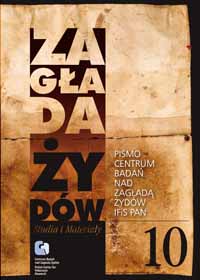Pinkes Warsze – Kronika Warszawy
Warsaw Chronicle
Author(s): Adam KopciowskiSubject(s): History
Published by: Stowarzyszenie Centrum Badań nad Zagładą Żydów & IFiS PAN
Keywords: Jewish books of memory; Warsaw; Warsaw compatriots’ association in Argentina; extermination of Jews in Warsaw – historiography and memories
Summary/Abstract: Published in 1955 in Argentina, the Warsaw memory book titled Pinkes Warsze [Warsaw chronicle] was written on the initiative of the Argentinean Association of Warsaw and its Vicinity Compatriots (Landslajt-Farajn fun Warsze un Umgegnt in Argentine), established a decade earlier. The book was published in cooperation with the Argentinean branch of the left-wing Jewish Culture League (Yidisher Kultur Farband), with the writer and journalist Pinie Kac as the editor-in-chief. The chronicle is entirely in Yiddish. Divided into seven parts, the book contains texts devoted to the history of Jews in Warsaw until 1939, their culture (literature, theatre, music, painting, folklore), the occupation and post-war period, and the history of Warsaw compatriots’ associations in Argentina, the USA, and Brazil. The last part contains obituaries. Similarly to other publications of this type, the Warsaw memory book contains materials diverse both in terms of genre and origin. Aside from historical studies there are also literary texts, poetry, memories, testimonies, biographic entries, and source materials. The materials also vary in terms of content and style – from reliable studies with back matter written by professional scholars to more or less successful, and at times completely amateur, journalism. From the point of view of a modern scholar of the Holocaust the Warsaw memory book published in 1955 in Buenos Aires has little informative value. Most of the studies and testimonies it contains were taken from works published earlier or from the ŻIH Archive. Undoubtedly being a peculiar testimony to that period, the book bears a clear, excessively leftist ideological mark. The chapter devoted to the occupation period lays apparent and disproportional stress on the threads connected with the resistance movement and the uprising in the ghetto (while also stressing the communists’ special role in those events) at the expense of the subject matter of martyrdom, particularly the issue of the everyday life and living conditions in the closed district in Warsaw.
Journal: Zagłada Żydów. Studia i Materiały
- Issue Year: 2014
- Issue No: 10
- Page Range: 462-473
- Page Count: 12
- Language: Polish

